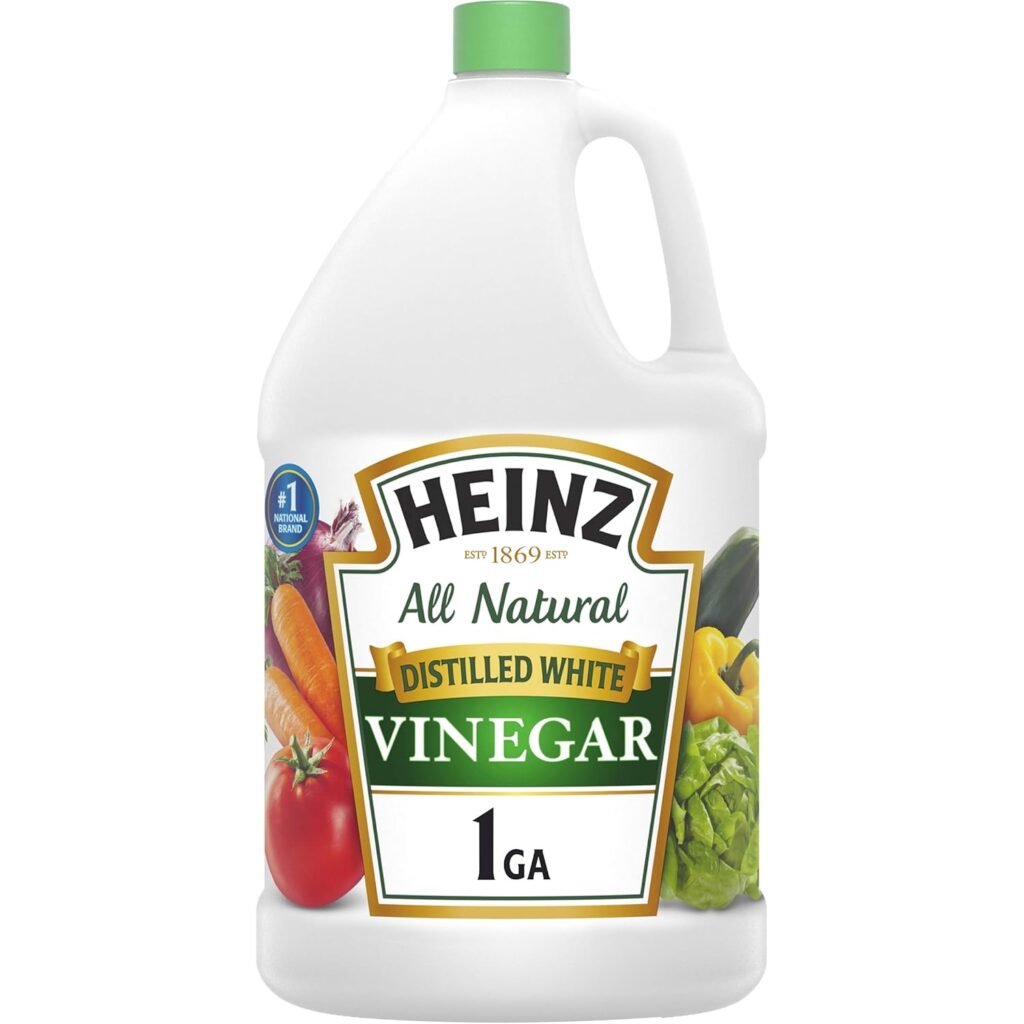White vinegar is a common household item that most people have in their kitchens, but its uses go far beyond cooking. This simple, clear liquid is made from the fermentation of grain alcohol and is known for its acidic properties. In this article, we’ll explore the many uses of white vinegar, its benefits, and why it should be a staple in every home.
What is White Vinegar?
White vinegar is a type of vinegar that is typically composed of 4-7% acetic acid and 93-96% water. Its clear, colorless appearance and strong, tangy taste make it distinct from other types of vinegar, like apple cider vinegar or balsamic vinegar. The acetic acid gives it a sharp flavor and makes it an effective cleaning agent and preservative.
Uses of White Vinegar in the Kitchen
White vinegar is widely used in cooking and food preparation. Its versatility in the kitchen is unmatched, and here are some common uses:
1. Cooking and Baking
White vinegar is often used in recipes for its tangy flavor. It can be added to salad dressings, marinades, and pickling brines. When baking, white vinegar can be used to activate baking soda, helping cakes and cookies rise.
2. Pickling
One of the most popular uses of white vinegar is in pickling. Its acidity helps preserve vegetables and gives pickles their characteristic sour taste. White vinegar is preferred for pickling because it doesn’t alter the color of the produce, keeping pickled items looking fresh and vibrant.
3. Tenderizing Meat
White vinegar can also be used as a marinade to tenderize meat. The acidity helps break down the proteins in the meat, making it more tender and flavorful. Simply mix white vinegar with herbs, spices, and oil to create a simple and effective marinade.
Cleaning with White Vinegar
Beyond the kitchen, white vinegar is a powerful and eco-friendly cleaning agent. Its acidity makes it effective at cutting through grease, grime, and mineral deposits. Here are some ways to use white vinegar around the house:
1. Surface Cleaner
White vinegar can be used to clean a variety of surfaces, including countertops, windows, and mirrors. Mix equal parts of white vinegar and water in a spray bottle to create an all-purpose cleaner. This solution can effectively remove dirt and bacteria without the need for harsh chemicals.
2. Deodorizing
If you have strong odors in your home, white vinegar can help neutralize them. Place a small bowl of white vinegar in areas with unpleasant smells, such as the kitchen or bathroom, and let it sit for a few hours. The vinegar will absorb the odors, leaving the area smelling fresh.
3. Unclogging Drains
White vinegar can be used to clear clogged drains. Pour a cup of baking soda followed by a cup of white vinegar down the drain, and let the mixture fizz for about 15 minutes. Then, flush the drain with hot water to clear the clog.
4. Removing Stains
White vinegar is effective at removing stains from carpets and fabrics. For carpet stains, blot the area with a cloth soaked in white vinegar, then sprinkle baking soda on top and let it sit until dry. Vacuum up the residue, and the stain should be gone.
Health and Beauty Uses of White Vinegar
White vinegar also has several uses in health and beauty routines. Its natural acidity makes it beneficial for skin and hair care, as well as a home remedy for minor ailments.
1. Hair Rinse
A white vinegar rinse can help remove product buildup and add shine to your hair. After shampooing, dilute white vinegar with water and pour it over your hair. Rinse thoroughly with water to remove the vinegar. This can leave your hair feeling soft and looking shiny.
2. Skin Toner
White vinegar can be used as a natural skin toner. Dilute it with water and apply it to your face with a cotton ball to help balance your skin’s pH levels and reduce acne. However, it’s important to do a patch test first to ensure your skin doesn’t react negatively to the vinegar.
3. Soothe Sunburn
White vinegar can help soothe sunburned skin. Mix equal parts of white vinegar and water, then apply it to the affected area with a soft cloth. The vinegar helps cool the skin and reduce redness.
Gardening and Pest Control
White vinegar isn’t just useful indoors; it can also be a valuable tool in the garden. Its acidity makes it effective for a variety of gardening tasks:
1. Weed Killer
White vinegar can be used as a natural herbicide. Spray undiluted white vinegar directly onto weeds to kill them. This method is especially effective on young weeds and can be used as an eco-friendly alternative to chemical weed killers.
2. Pest Deterrent
White vinegar can help deter pests in the garden. Spraying a mixture of white vinegar and water around the perimeter of your garden can keep ants, rabbits, and other pests away. Be cautious when spraying near plants, as the vinegar’s acidity can damage them.
Safety and Precautions
While white vinegar is generally safe to use, it’s important to follow some precautions:
- Avoid Contact with Eyes: White vinegar is acidic and can cause irritation if it gets into your eyes. If contact occurs, rinse thoroughly with water.
- Dilution for Skin Use: When using white vinegar on the skin or hair, always dilute it with water to prevent irritation.
- Avoid Use on Natural Stone: White vinegar can damage natural stone surfaces like granite or marble. Use a stone-safe cleaner instead.
Conclusion
White vinegar is an incredibly versatile and useful product that can be used for cooking, cleaning, health, beauty, and even gardening. Its affordability, effectiveness, and eco-friendliness make it a must-have in every household. Whether you’re looking to enhance your cooking, clean your home, or try natural remedies, white vinegar is a powerful tool that offers countless benefits.



